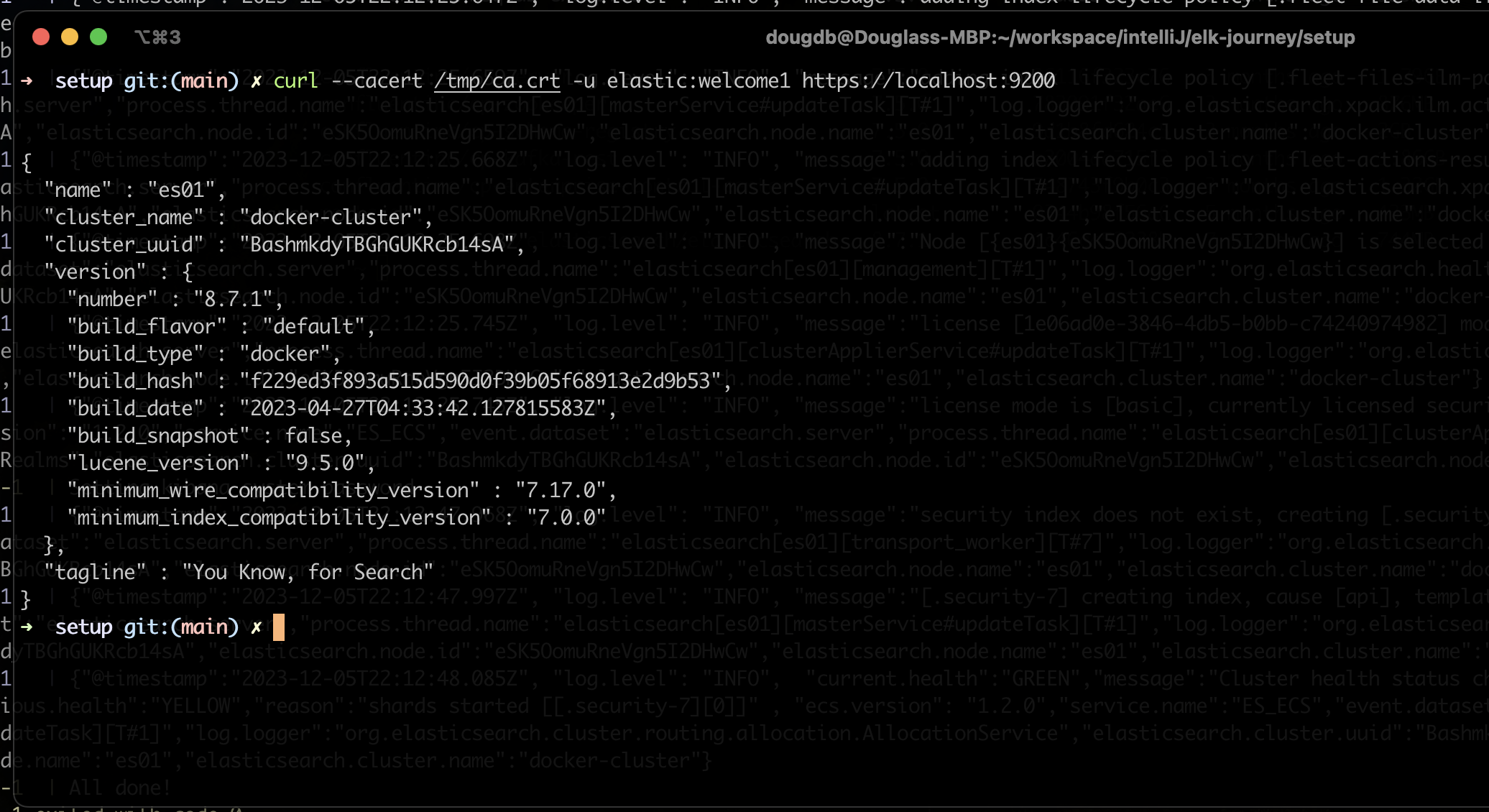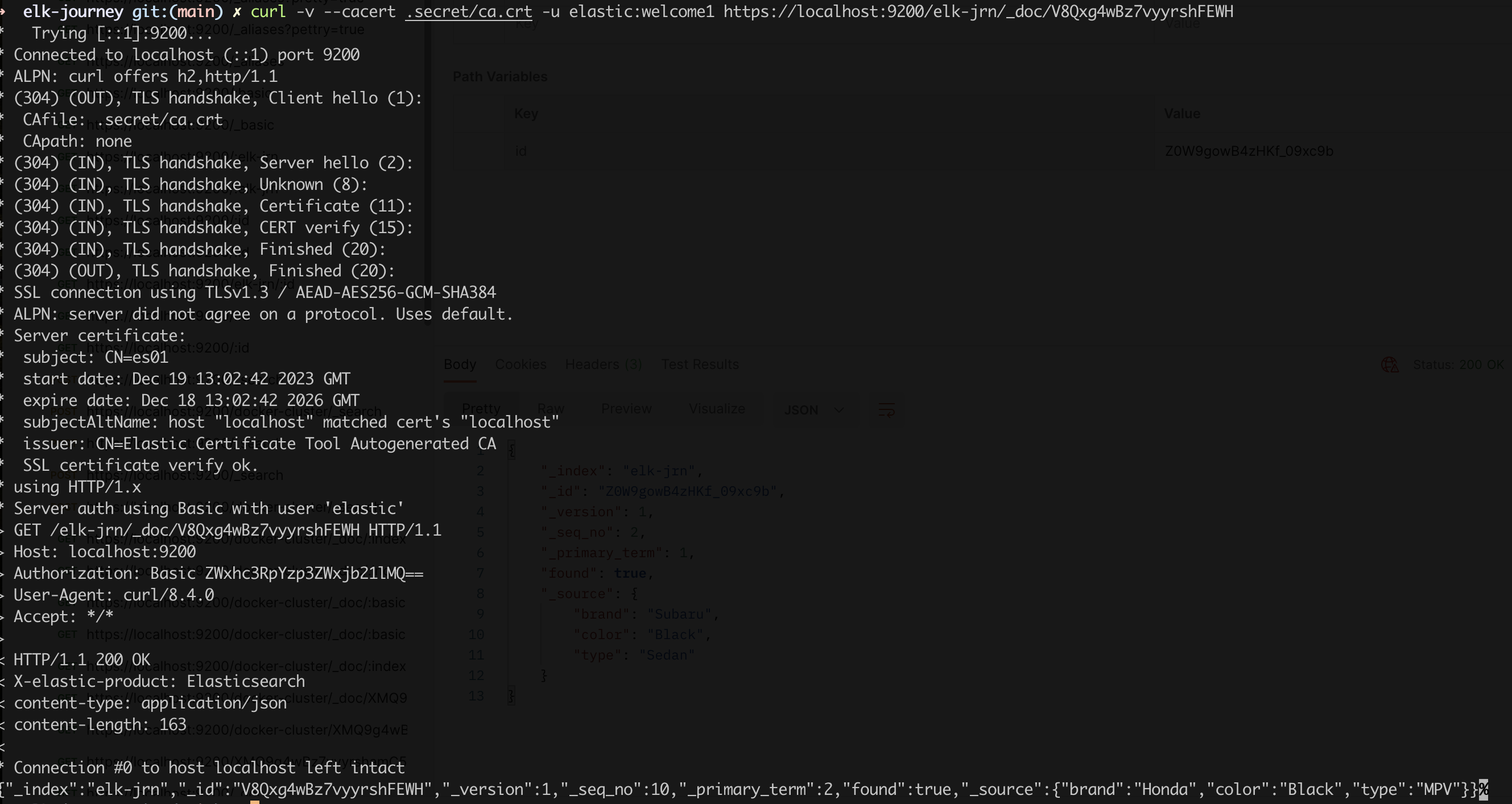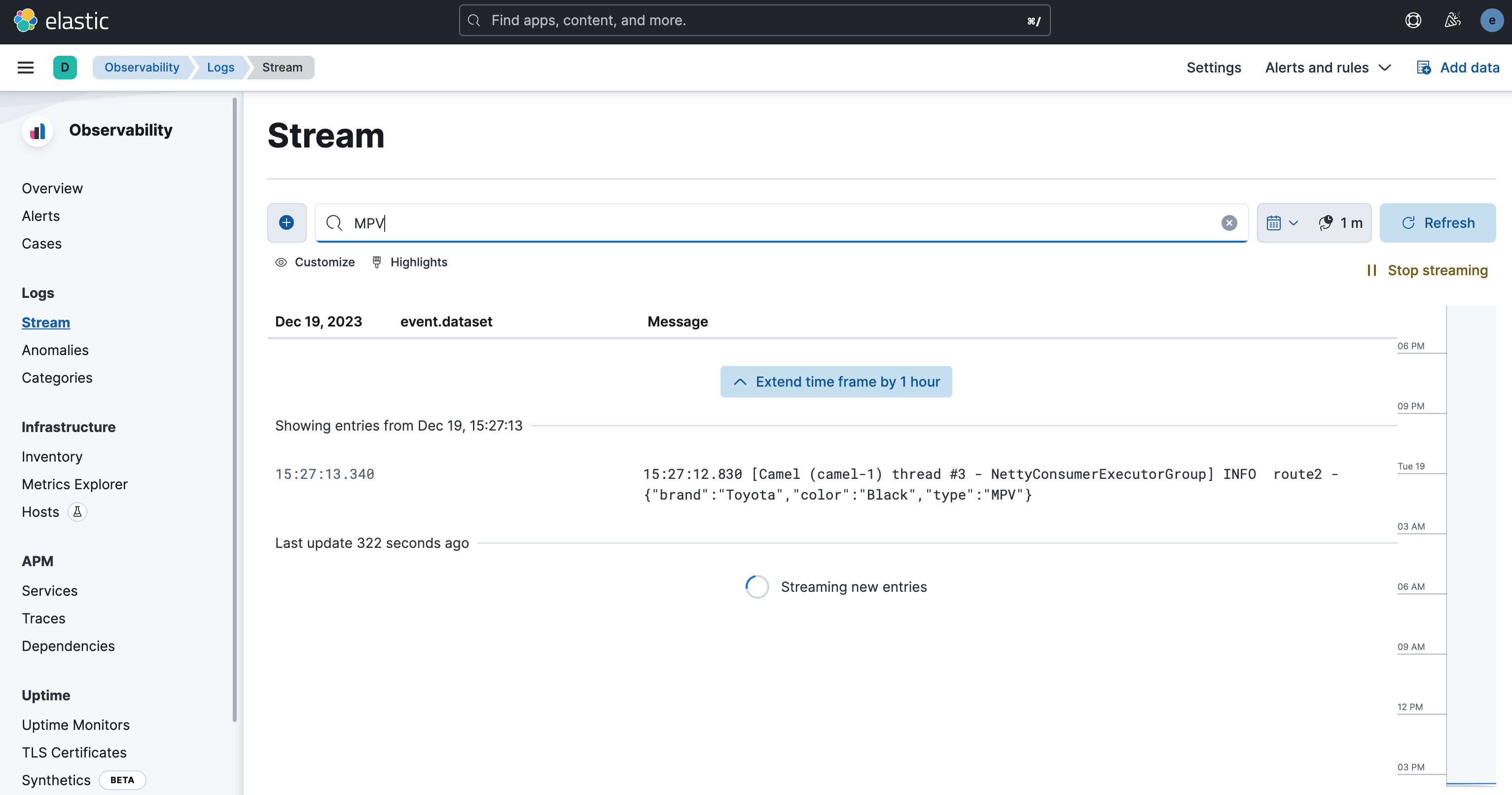-
As the Elastic Stack has grown over the years and the feature sets have increased, so has the complexity of getting started or attempting a proof-of-concept (POC) locally, while Elastic Cloud is still the fastest and easiest way to get started with Elastic, the need for local development and testing is still widely abundant, we’ll dive into configuring the components of a standard Elastic Stack consisting of Elasticsearch, Logstash, Kibana, and Beats (ELK-B), on which we can immediately begin developing, Filebeat, Metricbeat, and Logstash will all need additional configuration from yml files. see docker-compose.yml file
-
The setup container will start up first, wait for the ES01 container to come online, all the certificates to the “certs” volume so that all other containers can have access to them
docker cp setup-es01-1:/usr/share/elasticsearch/config/certs/ca/ca.crt ../.secret/ca.crt # project folder curl -v --cacert ../.secret/ca.crt -u elastic:welcome1 https://localhost:9200 # any folder with cp to tmp folder curl --cacert /tmp/ca.crt -u elastic:welcome1 https://localhost:9200 curl -v --cacert ../../.secret/ca.crt -u elastic:welcome1 https://localhost:9200/_count curl -v --cacert ../../.secret/ca.crt -u elastic:welcome1 https://localhost:9200/_doc?elk-jrn=V8Qxg4wBz7vyyrshFEWH
-
ELK Local Links
-
What is Elasticsearch
-
What is Logstash
-
Is an Open Source processing engine responsible for receiving processing and shipping events, we can manipulate the data, cleaning or enriching data
-
-
What is FileBeat
-
Sample of expression
John Doe john@doe.com 32
%{WORD:first_name} %{WORD:last_name} %{EMAILADDRESS:email} %{INT:age}curl -v -X GET -H "Content-type: application/json" http://localhost:12666/api/car/v1/random
https://localhost:9200/elk-jrn/_doc/:id
curl -v --cacert .secret/ca.crt -u elastic:welcome1 https://localhost:9200/elk-jrn/_doc/V8Qxg4wBz7vyyrshFEWHinput {
file {
path => "/path/to/logstash/event-data/apache_*.log"
start_position => "beginning"
}
http {
}
}
filter {
if [headers][request_path] =~ "error" or [path] =~ "errors" {
mutate {
replace => { type => "error" }
}
} else {
mutate {
replace => { type => "access" }
}
grok {
match => { "message" => '%{HTTPD_COMMONLOG} "%{GREEDYDATA:referrer}" "%{GREEDYDATA:agent}"' }
}
if "_grokparsefailure" in [tags] {
drop { }
}
useragent {
source => "agent"
target => "ua"
}
# Admin pages
if [request] =~ /^\/admin\// {
drop { }
}
# Static files
if [request] =~ /^\/js\//
or [request] =~ /^\/css\//
or [request] in ["/robots.txt", "/favicon.ico"] {
drop { }
}
# Crawlers
if [ua][device] == "Spider" {
drop { }
}
mutate {
convert => {
"response" => "integer"
"bytes" => "integer"
}
}
date {
match => [ "timestamp", "dd/MMM/yyyy:HH:mm:ss Z" ]
remove_field => [ "timestamp" ]
}
geoip {
source => "clientip"
}
}
mutate {
remove_field => [ "headers", "@version", "host" ]
}
}
# Only dev purpose
output {
stdout {
codec => rubydebug
}
file {
path => "%{type}_%{+yyyy_MM_dd}.log"
}
}input {
file {
path => "/path/to/logstash/event-data/apache_*.log"
start_position => "beginning"
}
file {
path => "/path/to/logstash/event-data/java_errors.log"
start_position => "beginning"
codec => multiline {
pattern => "^%{CATALINA_DATESTAMP}"
negate => true
what => "previous"
auto_flush_interval => 5
}
}
}
filter {
if [headers][request_path] =~ "error" or [path] =~ "errors" {
mutate {
replace => { type => "error" }
}
} else {
mutate {
replace => { type => "access" }
}
grok {
match => { "message" => '%{HTTPD_COMMONLOG} "%{GREEDYDATA:referrer}" "%{GREEDYDATA:agent}"' }
}
if "_grokparsefailure" in [tags] {
drop { }
}
useragent {
source => "agent"
target => "ua"
}
# Admin pages
if [request] =~ /^\/admin\// {
drop { }
}
# Static files
if [request] =~ /^\/js\//
or [request] =~ /^\/css\//
or [request] in ["/robots.txt", "/favicon.ico"] {
drop { }
}
# Crawlers
if [ua][device] == "Spider" {
drop { }
}
mutate {
convert => {
"response" => "integer"
"bytes" => "integer"
}
}
date {
match => [ "timestamp", "dd/MMM/yyyy:HH:mm:ss Z" ]
remove_field => [ "timestamp" ]
}
geoip {
source => "clientip"
}
}
mutate {
remove_field => [ "headers", "@version", "host" ]
}
}
output {
if [type] == "access" {
elasticsearch {
hosts => ["localhost:9200"]
document_type => "default"
#index => "%{type}-%{+YYYY.MM.dd}"
http_compression => true
}
} else {
stdout {
codec => rubydebug
}
}
}input {
file {
path => "/path/to/logstash/event-data/apache_*.log"
start_position => "beginning"
}
file {
path => "/path/to/logstash/event-data/java_errors.log"
start_position => "beginning"
codec => multiline {
pattern => "^(\s+|\t)|(Caused by:)"
what => "previous"
auto_flush_interval => 5
}
}
}
filter {
if [headers][request_path] =~ "error" or [path] =~ "errors" {
mutate {
replace => { type => "error" }
}
} else {
mutate {
replace => { type => "access" }
}
grok {
match => { "message" => '%{HTTPD_COMMONLOG} "%{GREEDYDATA:referrer}" "%{GREEDYDATA:agent}"' }
}
if "_grokparsefailure" in [tags] {
drop { }
}
useragent {
source => "agent"
target => "ua"
}
# Admin pages
if [request] =~ /^\/admin\// {
drop { }
}
# Static files
if [request] =~ /^\/js\//
or [request] =~ /^\/css\//
or [request] in ["/robots.txt", "/favicon.ico"] {
drop { }
}
# Crawlers
if [ua][device] == "Spider" {
drop { }
}
mutate {
convert => {
"response" => "integer"
"bytes" => "integer"
}
}
date {
match => [ "timestamp", "dd/MMM/yyyy:HH:mm:ss Z" ]
remove_field => [ "timestamp" ]
}
geoip {
source => "clientip"
}
}
mutate {
remove_field => [ "headers", "@version", "host" ]
}
}
output {
if [type] == "access" {
elasticsearch {
hosts => ["localhost:9200"]
document_type => "default"
#index => "%{type}-%{+YYYY.MM.dd}"
http_compression => true
}
} else {
stdout {
codec => rubydebug
}
}
}GET /_template/filebeat-*-
Automatically benefit from boilerplate configuration
-
Reduce the risk of mistakes (e.g forgetting to handle some scenarios)
-
Make use of modules as much possible
-
Configure manual inputs when a suitable module is not available
-
Prefer either using modules, or not using modules at all; a combination is harder to maintain


